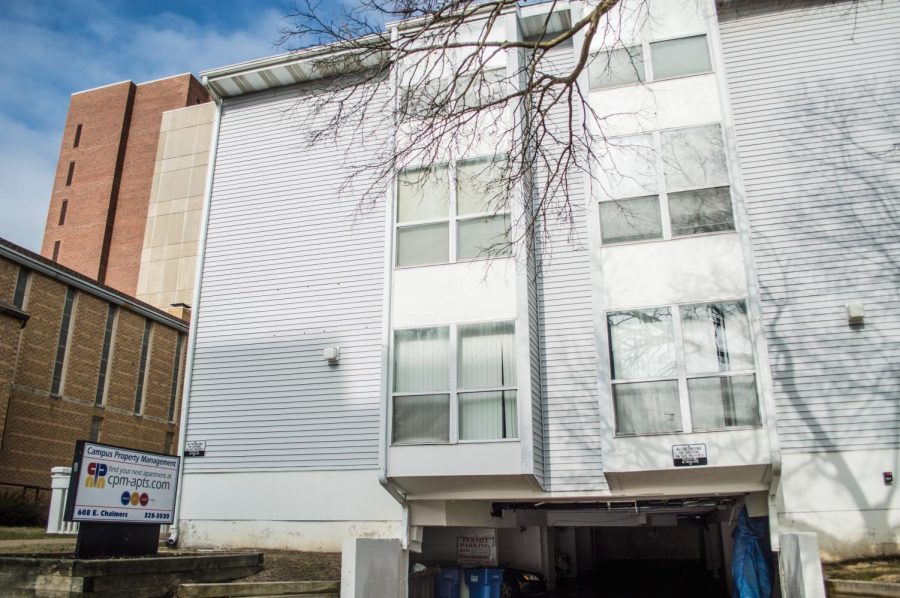Scammers target students on campus
Residents of the apartment complex at 608 E. Chalmers St. had many complaints regarding recent scammers.
Feb 4, 2019
Scammers posing to be employees of local energy company Ameren have been seen around the campus for years now attempting to take advantage of students, many of whom are living unsupervised for the first time in their lives.
Brian Bretsch, Ameren Illinois spokesman, said the company will call before showing up at students’ doors for any reason.
“We are not going to come to your front door and knock on it and say that we have a deal that can save you on the supply side of your business because we simply don’t work in the supply area,” Bretsch said.
Scammers target students using door-to-door tactic
Uploaded by The Daily Illini on 2019-02-03.
Get The Daily Illini in your inbox!
Lindsay Obeso, senior in LAS, has experienced this firsthand. She said she and her roommate heard a knock on their door during the day and the person at the door said he was sent by their rental company, Campus Property Management.
However, after checking with CPM, Obeso was told the person was not sent by the rental company and was attempting to scam them.
“My roommate was talking with him and is concerned because he’s telling us that there’s a problem,” Obeso said. “She’s about to give him our information and she’s looking at me, who’s on the couch, and we’re just like, ‘Well we didn’t get an email, so come back when we’re told,’ and I pulled her away from the door.”
Obeso was initially suspicious of the individual who had come to her door because in the past, Ameren had always emailed her first. She also found it odd that the only things the scammer asked for were their names and email addresses.
Bretsch said there are steps to be taken to avoid falling victim to these scams.
“If you’re feeling uncomfortable or feeling caught off guard when someone knocks on your door and wants personal information from you, the first thing we always tell people to do is ask them to give you a couple of seconds,” Bretsch said. “Don’t let (scammers) in. Close the door and say, ‘I’m gonna make a quick phone call to Ameren Illinois.’”
Brestch also said phone scams are reported to Ameren more often than door-to-door scams.
The phone schemes involve getting a call from someone claiming to be a representative from Ameren who will then claim that a bill is overdue by an extreme amount and that, without payment, power will be shut off, Brestch said. The caller will then ask the victim to purchase prepaid money cards in order to transfer the money without any ability to track it.
“We would never call and demand immediate payment be made over the phone, and we would never give you two hours. Cutting off power to our customers is always our last resort,” Bretsch said. “What we would do if you happen to be late on a payment is that we would send you an email or a text message, and we would give you a grace period to become whole on your bill.”
Aside from these scams, there are also other tactics students should keep an eye out for to ensure their safety.
Pat Wade, communications director for the University of Illinois Police Department, said there are also representatives from legitimate energy companies who are trying to sell an alternative electricity source to students.
“Essentially what happens is that these different energy companies send out their representative to campus and try to get students to try to get energy from them, but what they do is that they use very high-pressure sales tactics and misleading sales tactics,” Wade said. “So it’s not technically a scam because technically, they’re legitimate businesses providing the service that they say they’re going to provide, but a lot of the time, their salespeople are not using the most upstanding techniques when they’re trying to sell to students.”
Nia Ali-Valentine, junior in LAS, signed up for an energy plan through a representative of a residential electric supplier that provides services through Ameren, who came to her apartment.
After signing up for the plan, she said she had suspicions and researched the supplier online, only to find poor reviews saying that the program is a scam. Ali-Valentine then proceeded to cancel the energy plan.
However, there were two more occasions in which representatives came to her door trying to persuade her to sign up for the same service again.
“It was their practice to go door-to-door and scam for different companies, Ameren in this case, so I called a couple of times to cancel and make sure that our information was off of that because they asked for my name, my address, my number, just like identifying information,” she said.
Wade said no matter what the situation is, if you’re dealing with an illegitimate or legitimate energy provider spokesperson, you can always call the police for advice or to remove that individual from your place of residence.
“In the cases where you’re talking to someone in person if they knock on your door or something like that, you do not have to let them into your home,” Wade said. “I think that’s the biggest thing, and if you ask someone to leave your residence and they don’t leave right away that’s a huge red flag and you should call the police immediately and we can come out and help.”






